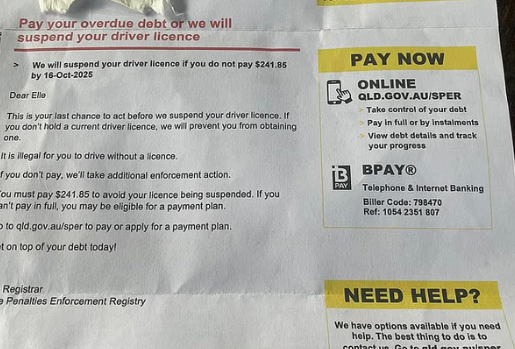
When most Australians think of skipping an election, they imagine a small fine and nothing more.
Few expect a letter warning their driver’s licence could be suspended if the fine isn’t paid.
For one Queensland woman, that unexpected escalation became a reality.
She recently shared her shock at receiving a State Penalties Enforcement Registry (SPER) notice demanding $241.85, with her licence at risk if she didn’t pay by 16 October.
Her ‘offence’? Failing to vote in a local government election.
The case sparked fierce debate online—some called the enforcement a ‘dictatorship’, while others argued that voting carries real consequences as part of civic duty.
Australia has had compulsory voting for federal elections since 1924, aiming to boost voter turnout and reduce campaign costs.
This makes Australia one of only a few countries where voting is legally required, not just a right.
Voting is considered a civic duty, akin to paying taxes, attending school, or serving on a jury, and the system has delivered impressive results.
The Australian Electoral Commission estimates 97.1 per cent of eligible citizens are enrolled, creating one of the world’s highest voter participation rates.
Many Australians don’t realise compulsory voting applies beyond federal elections—Queenslanders over 18 must vote in state and local elections, and the penalties can be steep.
The Queensland woman’s experience shows how a minor oversight can become a serious financial burden.
First, an ‘apparent failure to vote’ notice is sent, allowing citizens to explain whether they did or didn’t vote, or why they couldn’t.
Ignoring this notice or providing an unacceptable excuse leads to an infringement notice, with a penalty of one unit valued at $166.90 as of 1 July 2025.
Paying early reduces the fine by half, but missing the deadline escalates the matter.
Non-payment is referred to SPER under the State Penalties Enforcement Act, which adds an $80.85 registration fee—bringing the total to $241.85, the exact sum the Queensland woman faced.
SPER can enforce payment by suspending licences, garnishing wages, or deducting funds directly from bank accounts.
Valid excuses that might save you from a voting fine
- You were seriously ill or physically unable to vote
- You were outside your state or territory on polling day
- You had religious beliefs that prevented you from voting
- You were working in a remote area with no polling access
- You were in prison serving a sentence of less than three years
- You were overseas for work or family emergency
- You had no way of knowing about the election
Voting fines vary dramatically by state, creating a confusing patchwork for seniors who travel or have moved.
Victoria increased fines to $102 for elections after 1 July 2025, while the ACT maintains the lowest at $20.
Federal elections are $20 nationwide, and South Australia charges a $10 expiation fee plus a $105 Victims of Crime levy.
Queensland’s $166.90 fine sits at the higher end of the scale, highlighting the financial risk of ignoring notices.
State-by-state voting fines (2025)
Queensland: $166.90
Victoria: $102 (for elections after 1 July)
South Australia: $115 ($10 + $105 Victims of Crime levy)
Western Australia: $20 (first offence)
ACT: $20
Federal elections: $20 (nationwide)
For seniors, compulsory voting has long been part of civic life, but modern enforcement mechanisms can have harsh consequences.
Western Australia warns that ‘your driver’s licence could be suspended’ if matters are referred to their enforcement unit.
For those who rely on driving for appointments, socialising, and independence, this risk can be devastating.
Electoral commissions accept legitimate reasons for not voting, including serious illness, being overseas, religious beliefs, or lack of access to a polling place.
The Queensland woman’s case is a stark reminder of how seriously Australia treats voting.
While some view it as heavy-handed, compulsory voting helps ensure parliaments reflect the ‘will of the people’.
The key is staying proactive—check your enrolment, mark election dates, and respond promptly to any ‘apparent failure to vote’ notices with a valid explanation.
What This Means For You
Australia enforces compulsory voting to ensure high participation and that parliaments reflect the will of the people. Voting fines and penalties can escalate quickly if ignored, potentially affecting your finances and even your driver’s licence.
While valid excuses for missing an election do exist, it is crucial to communicate them promptly to avoid enforcement action. State fines also vary widely, making it essential to stay aware of deadlines and rules—especially for seniors, frequent travellers, or anyone who may have recently moved.
By staying informed and proactive, you can avoid unexpected penalties and ensure your civic responsibilities don’t come with a costly surprise.
If you found the discussion on voting fines and licence suspension eye-opening, there’s more to explore about how civic duties shape daily life.
Some rules and systems that seem straightforward on paper can have unexpected effects when put into practice.
A closer look at Australia’s broader political landscape provides real-life examples of these challenges.
Read more: Is Australia still a lucky country – or has the ‘Australian way’ lost its way?
Aussie woman slapped with massive fine and warned she could lose driver’s licence after failing to vote — Reports on a Queensland woman receiving a $241.85 SPER notice for not voting and the potential licence suspension.
https://www.dailymail.co.uk/news/article-15233015/Aussie-woman-slapped-massive-fine-lose-drivers-licence-act-dont-realise-illegal.html
Electoral Backgrounder: Compulsory voting—Australian Electoral Commission — Explains the introduction of compulsory voting in 1924 to boost turnout and reduce campaign costs.
https://www.aec.gov.au/about_aec/publications/backgrounders/compulsory-voting.htm
Penalty for Not Enrolling to Vote in Australia? | Fine for Not Voting—Lexology — Discusses compulsory voting laws and the history of voter enrolment requirements.
https://www.lexology.com/library/detail.aspx?g=dfbb9fe7-bf82-43c4-808b-7d4a9b159d93
Fact sheet—Compulsory voting—Elections ACT — Details voting as a civic duty, comparable to paying taxes or serving on a jury.
https://www.elections.act.gov.au/elections/education/fact-sheets/fact-sheet-compulsory-voting
Do I have to vote? | Electoral Commission of Queensland — Outlines Queensland’s voting requirements and the process for handling apparent failures to vote.
https://www.ecq.qld.gov.au/how-to-vote/do-i-have-to-vote
Didn't vote? | Victorian Electoral Commission — Provides information on fines for failing to vote in Victoria, including updated amounts for 2025.
https://www.vec.vic.gov.au/voting/fines-and-reviews
Australia's Voting Fine: $20 Penalty, Exemptions & What to Know — Explains federal voting fines, exemptions, and related administrative details.
https://stories.jobaaj.com/news-updates/politics/australia-s-voting-fine-20-penalty-exemptions-what-to-know
State elections — Law Handbook South Australia — Lists fines and levies for failing to vote in South Australian state elections.
https://lawhandbook.sa.gov.au/ch27s04s02.php
Didn't Vote? | Western Australian Electoral Commission — Warns about potential driver’s licence suspension for unresolved non-voting cases.
https://www.elections.wa.gov.au/vote/didnt-vote
Fact sheet—Compulsory voting—Elections ACT — Explains that compulsory voting ensures parliaments reflect the will of the people and government decisions consider all voters.
https://www.elections.act.gov.au/elections/education/fact-sheets/fact-sheet-compulsory-voting
Have you ever been caught off guard by a voting fine, or do you think Australia’s enforcement is too harsh?







